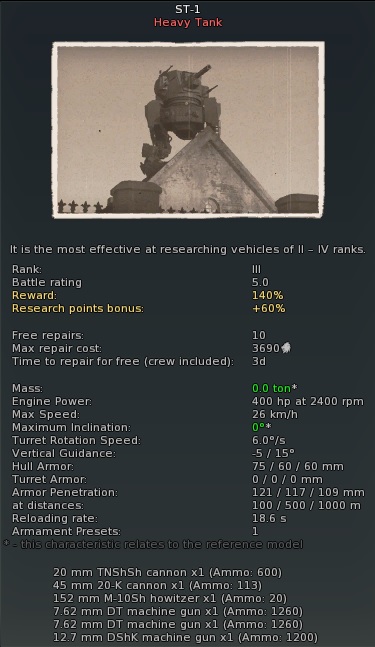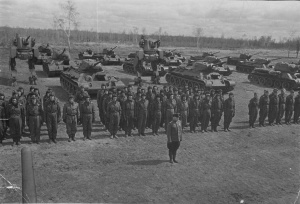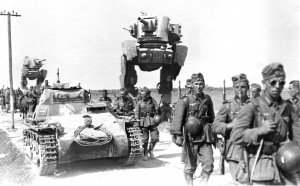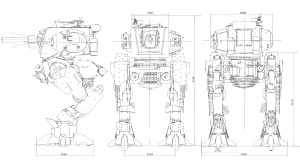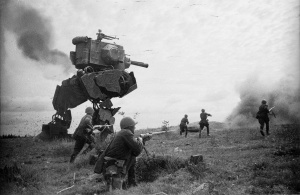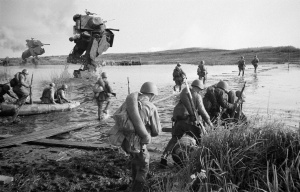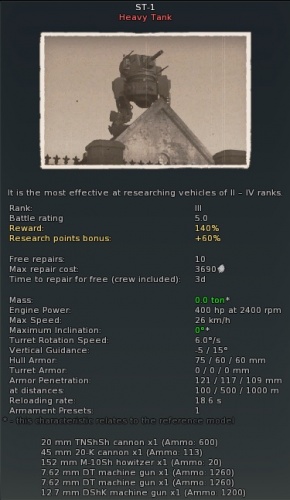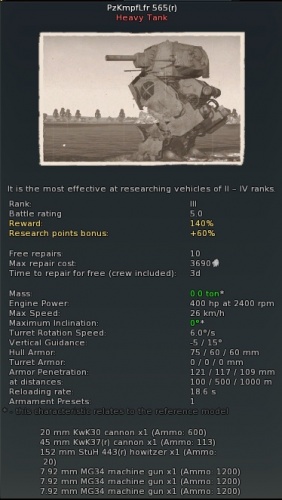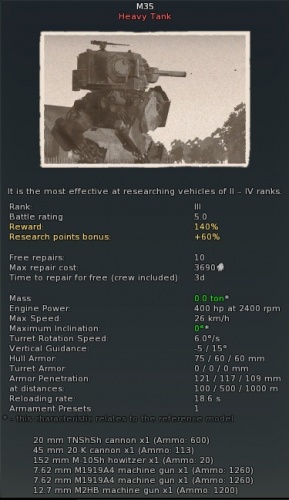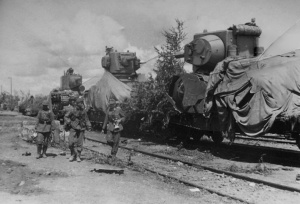Difference between revisions of "ST-1"
(Edits) |
(Edits) |
||
| Line 5: | Line 5: | ||
== "March to Victory!" == | == "March to Victory!" == | ||
| − | [[File:Events PrototypePhoto.jpg|thumbnail|left|Two 'Object 104' (later called ST-1) participating in field training exercises. | + | [[File:Events PrototypePhoto.jpg|thumbnail|left|Two 'Object 104' (later called ST-1) participating in field training exercises. Picture taken shortly after the first prototype trials.]] |
The ST-1, PzKpmfLfr 565(r) and M35 experimental combat walkers were featured in the ST-1 Alpha Test event during [[March_to_Victory!|"March to Victory!"]] 1st April day. These vehicles are not obtainable or unlockable in any other way and can only be used after reaching a certain amount of spawn points during gameplay of the ST-1 Alpha Test event. | The ST-1, PzKpmfLfr 565(r) and M35 experimental combat walkers were featured in the ST-1 Alpha Test event during [[March_to_Victory!|"March to Victory!"]] 1st April day. These vehicles are not obtainable or unlockable in any other way and can only be used after reaching a certain amount of spawn points during gameplay of the ST-1 Alpha Test event. | ||
| Line 20: | Line 20: | ||
[[File:Events BlueprintDrawingST1.jpg|thumbnail|right|Blueprint of the Object 104 (ST-1)]] | [[File:Events BlueprintDrawingST1.jpg|thumbnail|right|Blueprint of the Object 104 (ST-1)]] | ||
| − | '''''Central Archive of the Ministry of Defense of Russian Federation "Head armour command of the Red army Military representative's | + | '''''Central Archive of the Ministry of Defense of Russian Federation "Head armour command of the Red army Military representative's report on the execution of order for object 104":''''' |
"6 machines tested on the run. The following defects found: | "6 machines tested on the run. The following defects found: | ||
| Line 43: | Line 43: | ||
| − | Due to the difficult situation at the front and the military factories' relocation to the East, a decision had been made not to continue the production of walking tanks and concentrate on less spectacular but more efficient, easy to master and repair vehicles with traditional running gear. | + | Due to the difficult situation at the front and the military factories' relocation to the East, a decision had been made not to continue the production of walking tanks and concentrate on less spectacular but more efficient, easy to master and repair vehicles with traditional running gear. |
| − | |||
| − | |||
| Line 79: | Line 77: | ||
'''From the report of Wehrmacht's 14th tank division:''' | '''From the report of Wehrmacht's 14th tank division:''' | ||
| − | ''"... For the first time in the Eastern campaign we faced a new type of battle machine, | + | ''"... For the first time in the Eastern campaign we faced a new type of battle machine, it was hard to miss the complete superiority of a 55 ton walking tank….." |
"...Our 5cm KwK. tank cannon could penetrate the armour only in vulnerable spots and at very close distances (below 200 m)." | "...Our 5cm KwK. tank cannon could penetrate the armour only in vulnerable spots and at very close distances (below 200 m)." | ||
| Line 96: | Line 94: | ||
* V) Create a more powerful mine, that can render a 55 ton armoured walker unserviceable. For example, simply our existing mines are not enough…"'' | * V) Create a more powerful mine, that can render a 55 ton armoured walker unserviceable. For example, simply our existing mines are not enough…"'' | ||
| − | The Germans managed to capture several trial prototypes that were abandoned without fuel and ammunition. Despite the fact that the crews followed the instructions and tried to destroy their machines with hand grenades, the Germans managed to restore several machines in a few years and they took part in incidental skirmishes. | + | The Germans managed to capture several trial prototypes that were abandoned without fuel and ammunition. Despite the fact that the crews followed the instructions and tried to destroy their machines with hand grenades, the Germans managed to restore several machines in a few years and they took part in incidental skirmishes. |
[[File:Events M35statcard.jpg|thumbnail|right|x500px|One of the pre-production ST-1s given to the Americans designated "M35"]] | [[File:Events M35statcard.jpg|thumbnail|right|x500px|One of the pre-production ST-1s given to the Americans designated "M35"]] | ||
| Line 123: | Line 121: | ||
4. ''Powerplant:'' | 4. ''Powerplant:'' | ||
| − | The engine is very light for its size, since most of its parts are made from aluminium. Persistence for portability is shown. High fuel and oil consumption rates. Engine cooling is not up to our (US) standards and if it won't be compensated by the engine design itself, then the engine lifetime would be dramatically reduced. An air startup system could prove additionally effective… This needs to be researched as a reliable additional and alternative method of | + | The engine is very light for its size, since most of its parts are made from aluminium. Persistence for portability is shown. High fuel and oil consumption rates. Engine cooling is not up to our (US) standards and if it won't be compensated by the engine design itself, then the engine lifetime would be dramatically reduced. An air startup system could prove additionally effective… This needs to be researched as a reliable additional and alternative method of startup. |
'''OVERALL EVALUATION OF THE ST-1 TANK''' | '''OVERALL EVALUATION OF THE ST-1 TANK''' | ||
| Line 172: | Line 170: | ||
[[Category:April fool's day]] | [[Category:April fool's day]] | ||
| − | |||
[[Category:Removed vehicles]] | [[Category:Removed vehicles]] | ||
Latest revision as of 22:24, 21 December 2022
Contents
"March to Victory!"
The ST-1, PzKpmfLfr 565(r) and M35 experimental combat walkers were featured in the ST-1 Alpha Test event during "March to Victory!" 1st April day. These vehicles are not obtainable or unlockable in any other way and can only be used after reaching a certain amount of spawn points during gameplay of the ST-1 Alpha Test event.
First teased several days before the 1st April on War Thunder's Facebook and Twitter with a silhouette image of the ST-1 and the sub line "War. War changes. Soon", People first speculated on some sort of Soviet tank due to the resemblance to the KV-2 turret. At the same time the ST-1 was released, the SPS-255 tank along with "Unrealistic Battles" was also released.
ST-1
Development of the ST-1 started even before the start of World War II. The first world war, which was also called "the trench war", showed an inefficiency in the usual infantry breakthrough and required the creation of an absolutely new type of ground vehicle - something that could cross destroyed roads and ground torn apart from explosions. This is what the ST-1 was about - the first and the only model of a walking tank.
In April 1937, Armour Command of the Red Army sent the military operational requirements to Factory #184, these were the requirements for the development of "an armoured machine of a new type" with a maximum mass of 50 tons, protected by at least 60 mm of armour and the option to install different weapon types. Depending on the task of the battle machine, a 107 mm cannon, a 122 mm howitzer or 152 mm howitzer could be mounted. Additional weapons were a 45 mm cannon, a high-calibre AA machine gun and a 20 mm tank cannon.
In spite of the complexity of the task the construction bureau of the factory managed to cope with the new design and the new battle machine (object 104 in the factory numeration) reached the factory testing stage which lasted for a year. During this period a considerable number of flaws were detected, these issues were eliminated as the tests proceeded.
Central Archive of the Ministry of Defense of Russian Federation "Head armour command of the Red army Military representative's report on the execution of order for object 104":
"6 machines tested on the run. The following defects found:
- a) Replacement of the diesel engine and the electrical generator due to overheating and low oil pressure.
- b) Overheating of the main clutch mechanism.
- c) Unstable operation in the power drives of the side turrets.
- d) High temperature in the battle compartment.
- e) Unsatisfactory performance of gyro stabilization mechanisms."
In September 1939 after most of the defects had been eliminated, the development prototype obj. 104, (newly designated ST-1) was delivered to Moscow to be shown to members of the Soviet government and Red Army command. The demonstration of the new battle machine highly impressed the Soviet political and military leadership, and therefore it was decided to build a series of machines for operational trials. The new vehicles went through a baptism of fire during the Soviet-Finnish war. ST-1, along with new trial tanks the SMK and the T-100 had been sent to the front. Later, the ST-1 was changed to KV in the documents for disinformation purposes.
Not only did it have an extremely high cross-country ability, the ST-1 also was almost immune to anti-tank hedgehogs and mines. Even more so, thanks to it unique looks, it would spread fear and panic in enemy infantry ranks. 152 mm howitzer allowed to destroy concrete pill-boxes with a minimal ammo expenditure. Finnish 37 mm cannons could not penetrate the battle compartment's armour and Molotov cocktails were also useless due the high profile of the machine. The large "dead zone" of the main armament and limited range of vision were the main weaknesses. A successful combat deployment convinced even the most pessimistic military officials of the necessity to put ST-1 into mass production.
According to different sources by June of 1941 from 20 to 30 ST-1s were built. All of the aforementioned vehicles were deployed in the western military districts but by the beginning of the war, the machines were not fully mastered by the crews - also there was a lack of spare parts for repairs that resulted from a large amount of electrical failures In the course of the near-border battle in summer of 1941, all completed ST-1s were lost. But some of them were mentioned in German battle reports.
Due to the difficult situation at the front and the military factories' relocation to the East, a decision had been made not to continue the production of walking tanks and concentrate on less spectacular but more efficient, easy to master and repair vehicles with traditional running gear.
Variants of the ST-1
ST-1 (USSR)
Mainline version of the combat walker originally designated 'Object 104', later changed to ST-1.
Main Armament:
- 152 mm M-10Sh Howitzer x 1 (Ammo: 20)
Secondary Armament:
- 45 mm 20-K cannon x 1 (Ammo: 113)
- 20 mm TNShSH cannon x 1 (Ammo: 600)
Machine guns:
- 7.62 DT machine gun x 1 (Ammo: 1,260)
- 7.62 DT machine gun x 1 (Ammo: 1,260)
- 12.7 DShK machine gun x 1 (Ammo: 1,200)
PzKpmfLfr 565(r) (Germany)
Main Armament:
- 152 mm StuH 443(r) Howitzer x 1 (Ammo: 20)
Secondary Armament:
- 45 mm KwK37(r) cannon x 1 (Ammo: 113)
- 20 mm KwK30 cannon x 1 (Ammo: 600)
Machine guns:
- 7.92 MG 34 machine gun x 1 (Ammo: 1,200)
- 7.92 MG 34 machine gun x 1 (Ammo: 1,200)
- 7.92 MG 34 machine gun x 1 (Ammo: 1,200)
From the report of Wehrmacht's 14th tank division:
"... For the first time in the Eastern campaign we faced a new type of battle machine, it was hard to miss the complete superiority of a 55 ton walking tank….."
"...Our 5cm KwK. tank cannon could penetrate the armour only in vulnerable spots and at very close distances (below 200 m)."
"...our tanks' armour cannot stop the 15cm armour piercing shells, and even close detonation of an HE shell often led to penetration of the armour by its fragmentation effect"
"... The existing facts and besides that, the impression felt that Soviets know about their armoured walkers' technical superiority, should be taken into account and thoroughly investigated to avoid the damage that is being done to our armoured troops"
"... fight against Soviet armoured walkers and tanks with 8.8cm flak cannons and 10cm tank guns cannot be enough on their own. Both weapon types are cumbersome and in most cases they are already discovered, under fire and destroyed while trying to reach an optimum firing position."
"...In order to counter Soviet heavy tanks and armoured walkers the following detailed recommendations are presented for consideration:
- I) To develop assault weapons to fight heavily armoured targets:
- II) Besides other modernizations we should progress with the building of the 26 ton tank and use captured and undamaged 55-ton Soviet armoured walkers. 1 company of which is required for each tank regiment.
- III) We should design a 10 cm self-propelled anti-tank gun. At least 6 of these SPGs are required for each tank regiment.
- IV) Create new shell type with considerably higher armour-piercing capacity.
- V) Create a more powerful mine, that can render a 55 ton armoured walker unserviceable. For example, simply our existing mines are not enough…"
The Germans managed to capture several trial prototypes that were abandoned without fuel and ammunition. Despite the fact that the crews followed the instructions and tried to destroy their machines with hand grenades, the Germans managed to restore several machines in a few years and they took part in incidental skirmishes.
M35 (USA)
- 152 mm M-10Sh Howitzer x 1 (Ammo: 20)
Secondary Armament:
- 45 mm 20-K cannon x 1 (Ammo: 113)
- 20 mm TNShSH cannon x 1 (Ammo: 600)
Machine guns:
- 7.62 M1919A4 machine gun x 1 (Ammo: 1,260)
- 7.62 M1919A4 machine gun x 1 (Ammo: 1,260)
- 12.7 M2HB machine gun x 1 (Ammo: 1,200)
3 pre-production ST-1s were given to the US due to its technology exchange program. In Autumn of 1941 they were delivered to Aberdeen proving ground and were tested for 1.5 months.
What follows are the excerpts from the reports on the testing of the armoured battle machine of the new ST-1 type:
"1 . Armoured Chassis: A choice of the armour angling for hull plates and turret points to an excellent shell damage withstanding capacity...
2. Armament: Firepower much higher than any of our own tanks, makes it possible to destroy almost any target on the battlefield, including permanent concrete fortifications. In addition, the additional armament of a 45 mm cannon grants a high rate of fire whilst engaging lightly-armoured targets. Additional machine guns are reliable, of a very simple design and easy to produce and to instal, there are possibilities of replacing machine guns with equivalent ordnance of our design.
3. Vision and aiming devices: The aiming devices installed are perfect though the vision devices are not fully sighted, but passable. Overall visibility ranges are good.
4. Powerplant: The engine is very light for its size, since most of its parts are made from aluminium. Persistence for portability is shown. High fuel and oil consumption rates. Engine cooling is not up to our (US) standards and if it won't be compensated by the engine design itself, then the engine lifetime would be dramatically reduced. An air startup system could prove additionally effective… This needs to be researched as a reliable additional and alternative method of startup.
OVERALL EVALUATION OF THE ST-1 TANK
The Soviet walking tank, a vehicle of new design, difficult for mass production by semiskilled labor. The tank has good operating speeds, slight tractive resistance, insufficient ease of maintenance. Poor engine cooling limits its ability to operate in wide temperature ranges. High fuel and oil consumption. Good startup, reliable engine. Bad air filtration equipment and cooling make the tank maintenance more difficult."
Usage in battles
Describe the tactics of playing in the vehicle, the features of using vehicles in the team and advice on tactics. Refrain from creating a "guide" - do not impose a single point of view but instead give the reader food for thought. Describe the most dangerous enemies and give recommendations on fighting them. If necessary, note the specifics of the game in different modes (AB, RB, SB).
Pros and cons
Summarise and briefly evaluate the vehicle in terms of its characteristics and combat effectiveness. Mark its pros and cons in a bulleted list. Try not to use more than 6 points for each of the characteristics. Avoid using categorical definitions such as "bad", "good" and the like - use substitutions with softer forms such as "inadequate" and "effective".
Pros:
Cons:
History
In 1942 a squadron of ST-1s were on a regular scouting mission on the eastern front, however unknown to them the day's events would go down in history as one of the greatest unknown acts of the second world war.
Ivan Froldov was the sharp thinking commander of the 2nd walker scouting unit located east of Stalingrad and his command vehicle was the some what unusual ST-1. Carrying the code name "Comrade Red Tovash" his unit constantly ventured far in to German territory for dangerous missions be that disrupting supply lines or reconnaissance on vital German positions. On April the first 1942 Froldov and his platoon of 5 ST-1s were ordered to take out a fuel depot supplying the local Panzer force "at all cost" (somewhat common phrase in his many orders). setting our at early morning they traveled 30 miles in to German territory to complete their task. the [re-planned route took them through a thick forest and a small valley to arrive at their objective. As they began their attack they came under heavy fire confusing the ST-1 squadron, they had not expected such an defense so early on. Under the intense fire they were forced to retreat in to a small contour. Ivan came to realise that they must have been spotted while in the valley. With their cover blown Froldov had weighed up his choices and gave the command "Give 'em hell or we'll get there first!". With that his crew traveled full speed towards the dump, his gunner Vladimir managed to destroy one Panzer 3 with the 152 mm howitzer and a further 5 AT guns with the secondary cannons. His four wingmen supported him throughout the attack and within 10 minutes and with 6 tanks destroyed, the Germans had begun their retreat giving up the precious fuel dump. Calling back to their headquarters T-34s were soon in the area to reinforce the newly gained land. The five crews' miraculous achievement caused Stalin himself to say "Without men like this we can't win the war". The squadron did not go without casualties as Tovash 3 had a destroyed its 152 mm howitzer and Tovash 4 had somehow made it up onto of a two story building.
Secret post war documents show that the attack was also down to some luck, That day the defense of the fuel dump was reduced due to some tanks being moved out for an engagement further north and that most of the soldiers had never seen an ST-1 before and couldn't believe what they were seeing. there is also suggestions to that our glorious leader Kim Jong Un is planning on making an improved version of the ST-1.
Media
- Videos
See also
Links to the articles on the War Thunder Wiki that you think will be useful for the reader, for example:
- reference to the series of the vehicles;
- links to approximate analogues of other nations and research trees.


